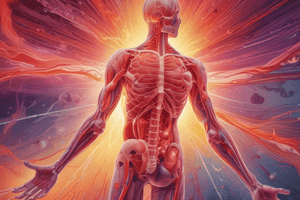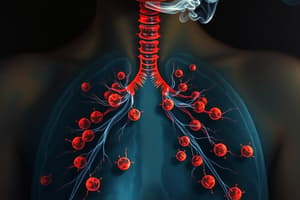Podcast
Questions and Answers
What is the role of histamine in acute inflammation?
What is the role of histamine in acute inflammation?
- Histamine stimulates the production of anti-inflammatory cytokines
- Histamine reduces pain sensation in inflamed areas
- Histamine promotes vasodilation and increases vascular permeability (correct)
- Histamine inhibits the release of inflammatory mediators
What are the major side effects of H1 and H2 receptor antagonists?
What are the major side effects of H1 and H2 receptor antagonists?
- Muscle weakness and visual disturbances
- Hypertension and tachycardia
- Respiratory depression and bradycardia
- Gastrointestinal disturbances and drowsiness (correct)
What are eicosanoids?
What are eicosanoids?
- Receptors responsible for leukotriene synthesis
- Transport proteins for histamine and 5-hydroxytryptamine
- Signaling molecules derived from arachidonic acid with diverse physiological effects (correct)
- Enzymes involved in the breakdown of prostaglandins
What is the main effect of aspirin on gastric cytoprotection?
What is the main effect of aspirin on gastric cytoprotection?
What is the pharmacological mechanism of action of NSAIDs like ibuprofen?
What is the pharmacological mechanism of action of NSAIDs like ibuprofen?
What are the two main isoforms of the enzyme responsible for the conversion of arachidonic acid to prostanoids?
What are the two main isoforms of the enzyme responsible for the conversion of arachidonic acid to prostanoids?
Which enzyme is responsible for the synthesis of prostanoids from arachidonic acid?
Which enzyme is responsible for the synthesis of prostanoids from arachidonic acid?
Which cells specialize in producing PGD2, a type of eicosanoid?
Which cells specialize in producing PGD2, a type of eicosanoid?
Which eicosanoid receptor subtype mediates the effects of prostaglandins?
Which eicosanoid receptor subtype mediates the effects of prostaglandins?
Which eicosanoid is responsible for bronchoconstriction, increased airway oedema, and secretion of thick mucus?
Which eicosanoid is responsible for bronchoconstriction, increased airway oedema, and secretion of thick mucus?
Which leukotriene receptor antagonist blocks the receptor for cysteinyl leukotrienes (LTC4, LTD4, LTE4)?
Which leukotriene receptor antagonist blocks the receptor for cysteinyl leukotrienes (LTC4, LTD4, LTE4)?
Which of the following are signs of inflammation?
Which of the following are signs of inflammation?
What is the role of histamine in acute inflammation?
What is the role of histamine in acute inflammation?
What are the physiological effects of H1 and H2 receptor activation by histamine?
What are the physiological effects of H1 and H2 receptor activation by histamine?
What is the role of 5-hydroxytryptamine (5-HT) or serotonin in inflammation?
What is the role of 5-hydroxytryptamine (5-HT) or serotonin in inflammation?
What are the key roles of local hormones in inflammation?
What are the key roles of local hormones in inflammation?
What is the main purpose of anti-inflammatory drugs?
What is the main purpose of anti-inflammatory drugs?
What can chronic inflammation lead to?
What can chronic inflammation lead to?
What are the sources of histamine production?
What are the sources of histamine production?
What are the specific therapeutic roles of H1 antagonists?
What are the specific therapeutic roles of H1 antagonists?
What is the role of 5-hydroxytryptamine (5-HT) or serotonin in platelet aggregation?
What is the role of 5-hydroxytryptamine (5-HT) or serotonin in platelet aggregation?
What is the primary function of inflammation?
What is the primary function of inflammation?
Which enzyme is involved in the formation of leukotrienes?
Which enzyme is involved in the formation of leukotrienes?
What is the role of H1 and H2 receptor antagonists in clinical practice?
What is the role of H1 and H2 receptor antagonists in clinical practice?
Which class of drugs inhibits the action of cyclooxygenases?
Which class of drugs inhibits the action of cyclooxygenases?
What are the major enzymatic pathways leading to the formation of prostaglandins and leukotrienes derived from?
What are the major enzymatic pathways leading to the formation of prostaglandins and leukotrienes derived from?
What is the primary role of eicosanoids in inflammation?
What is the primary role of eicosanoids in inflammation?
What is the main effect of aspirin on gastric cytoprotection?
What is the main effect of aspirin on gastric cytoprotection?
Which compound is involved in promoting tissue repair during inflammation?
Which compound is involved in promoting tissue repair during inflammation?
What is the clinical utility of H2 receptor antagonists?
What is the clinical utility of H2 receptor antagonists?
What is the primary function of 5-hydroxytryptamine (5-HT) in inflammation?
What is the primary function of 5-hydroxytryptamine (5-HT) in inflammation?
Flashcards are hidden until you start studying
Study Notes
Inflammation and its Mediators
- Inflammation is the body's response to invasion by pathogens and allergens, as well as injury from heat, ultraviolet, and chemicals.
- The signs of inflammation include warmth, redness, pain, swelling, and loss of function.
- Chronic inflammation can lead to severe tissue damage such as atherosclerosis.
- Anti-inflammatory drugs are commonly prescribed to manage inflammation.
- The timescale of events in inflammation spans from injury to resolution and repair, with mediator release, microvascular actions, and cell accumulation and activation.
- Local hormones, also known as chemical mediators, play a key role in orchestrating the complex responses of inflammation.
- Histamine is a crucial chemical mediator produced in response to various stimuli, released from mast cells, basophils, neurons, and histaminergic cells.
- Histamine receptors, including H1 and H2 receptors, produce physiological effects by activating second messenger systems.
- Stimulation of H1 and H2 receptors by histamine leads to actions such as vasodilation, increased permeability of post-capillary venules, increased heart rate, and contraction of non-vascular smooth muscle.
- Histamine plays important roles in acute inflammation and stimulating gastric acid secretion, with associated pathological roles.
- H1 and H2 antagonists are clinically important in treating acute inflammation and gastric problems, respectively, with specific therapeutic and side effects.
- 5-hydroxytryptamine (5-HT) or serotonin is a neurotransmitter derived from tryptophan and plays a role in platelet aggregation, gut movement, and inflammatory actions, promoting inflammation and stimulating mast cell adhesion and migration.
Studying That Suits You
Use AI to generate personalized quizzes and flashcards to suit your learning preferences.




